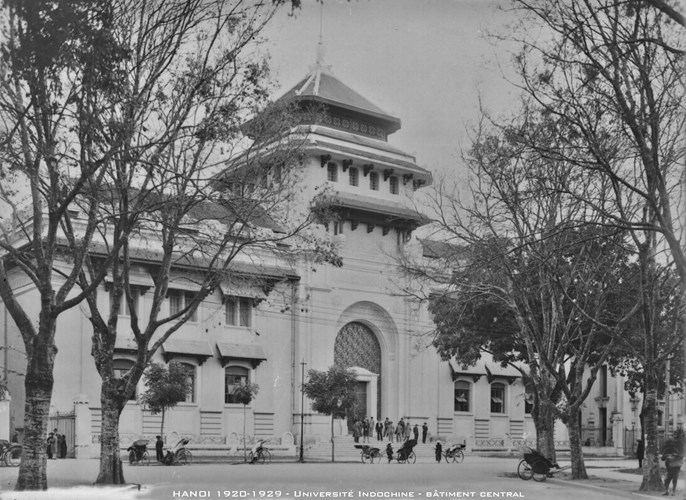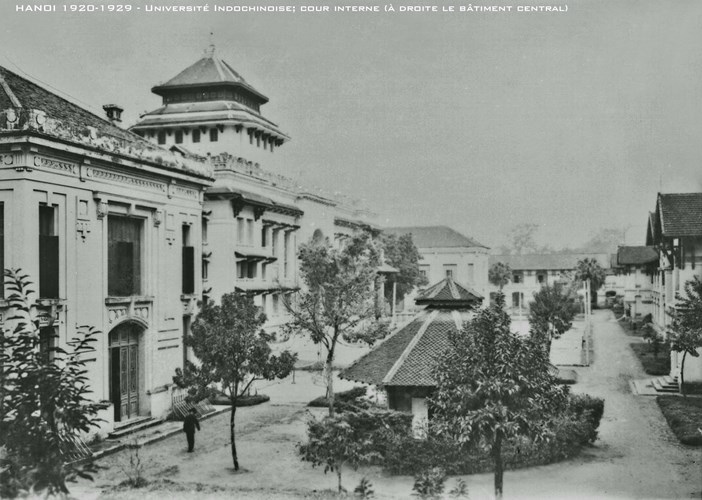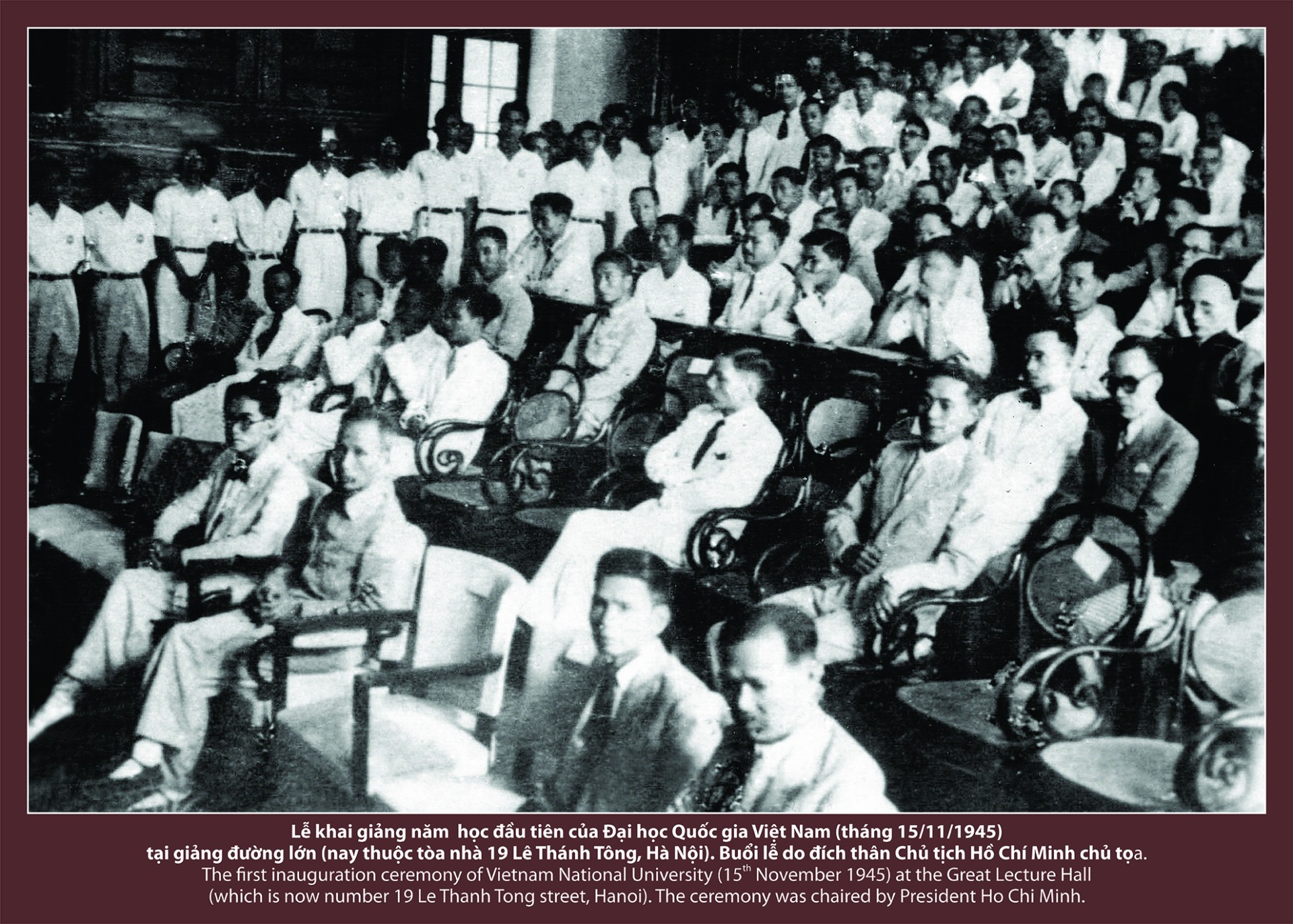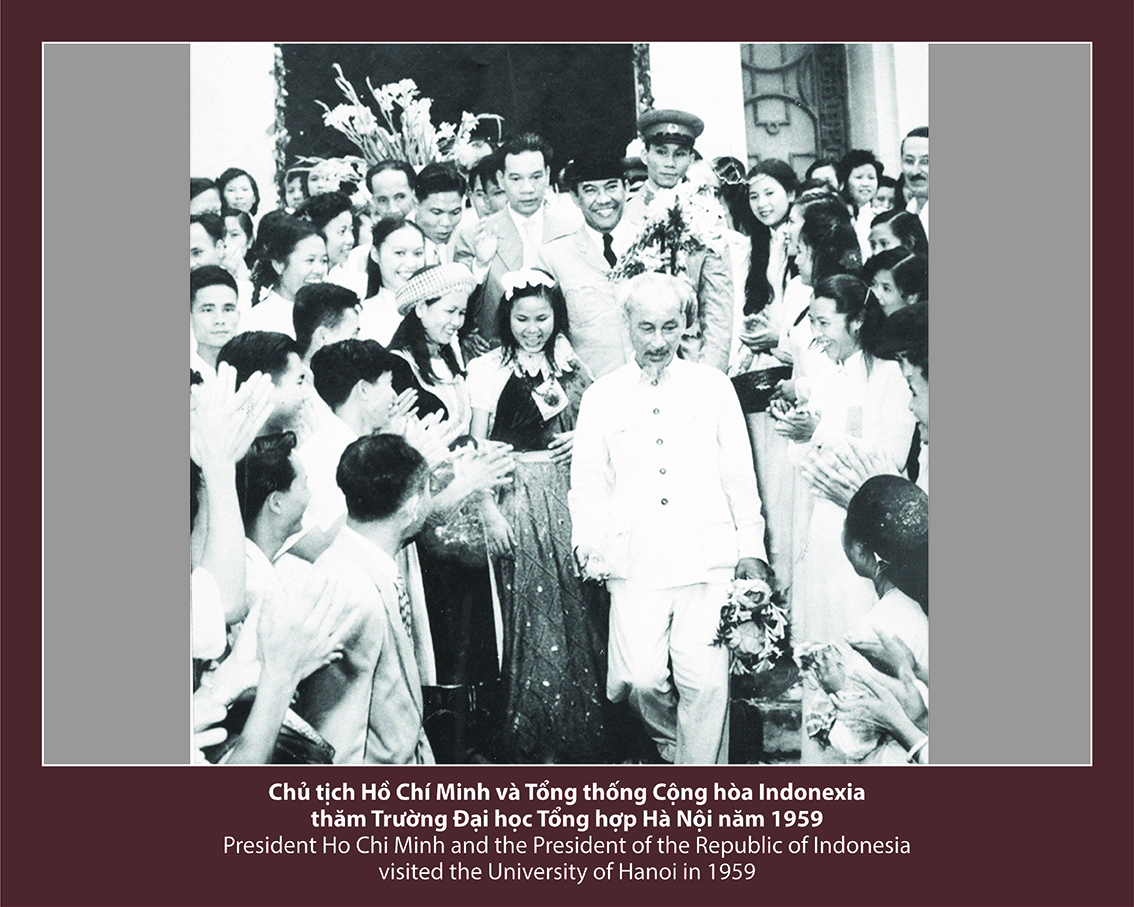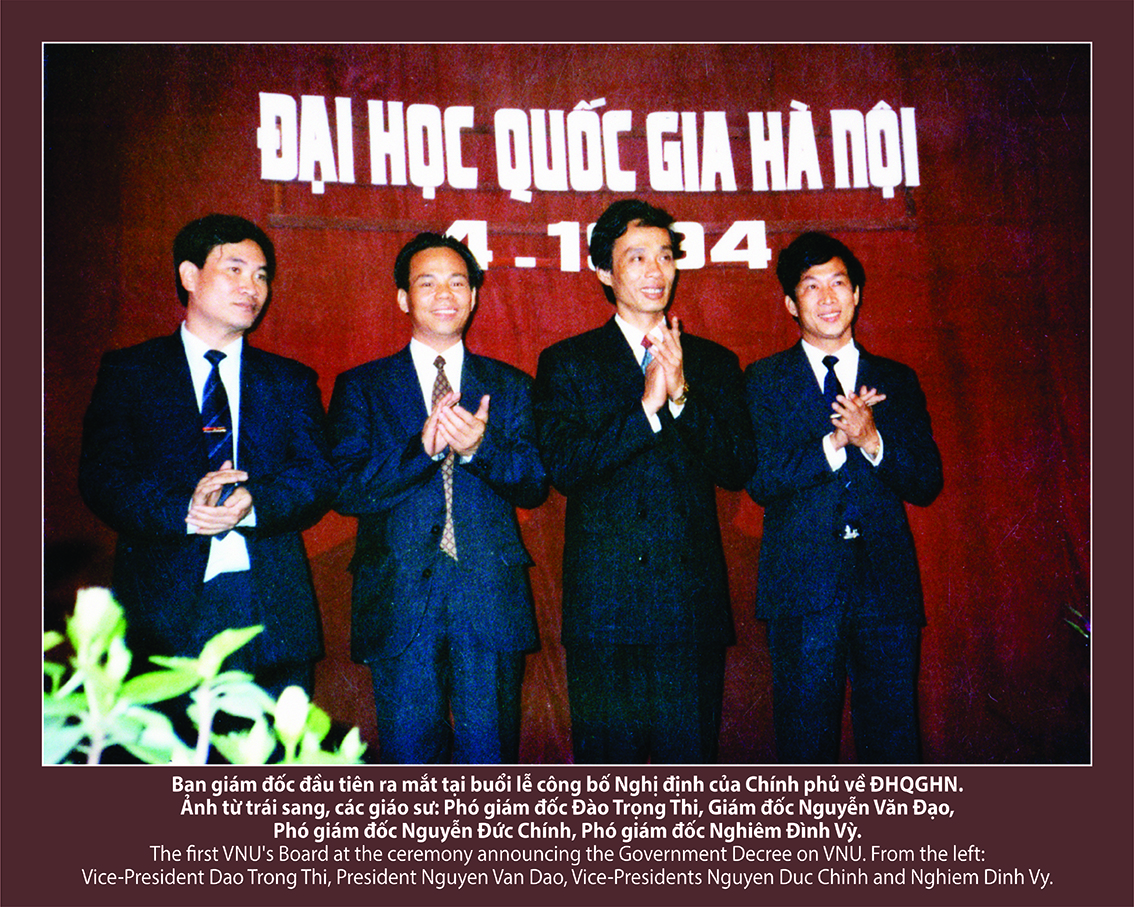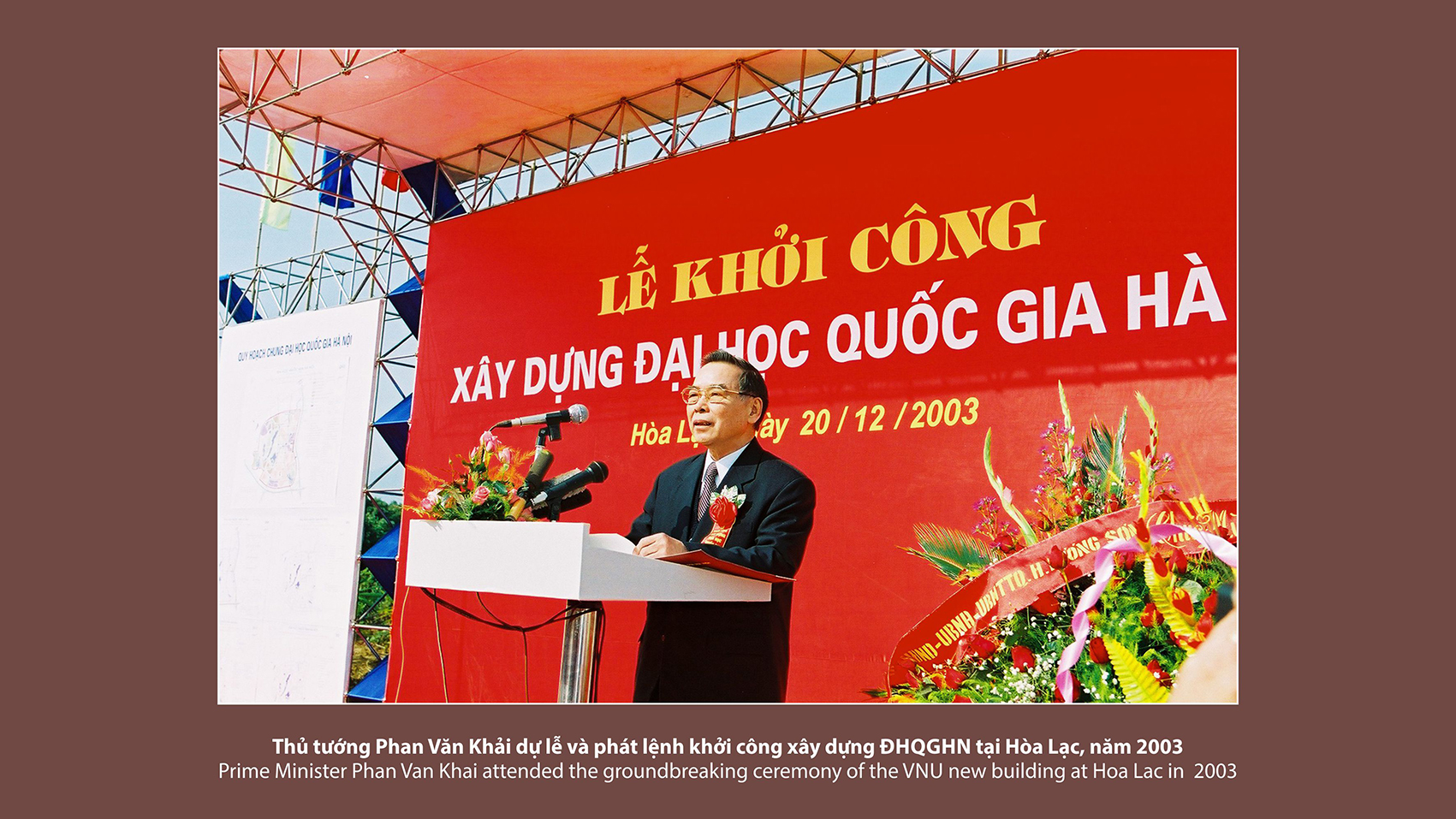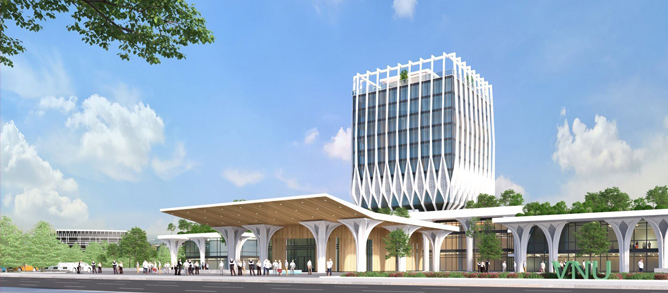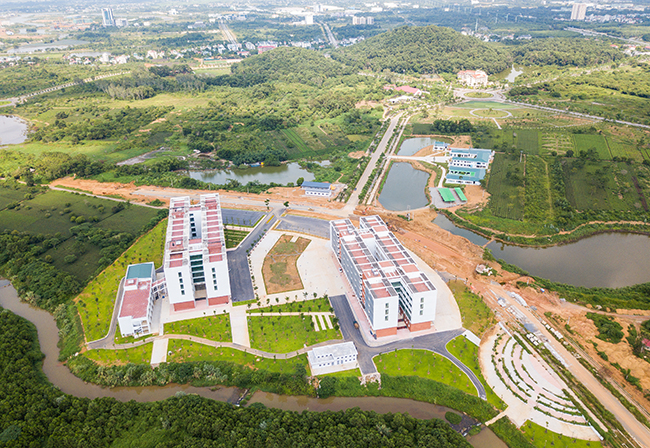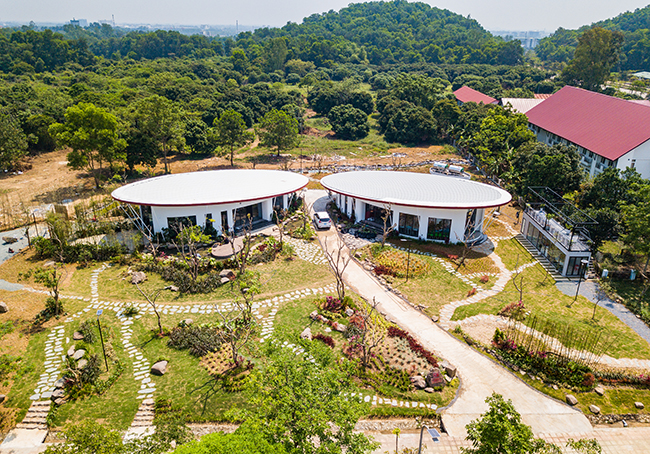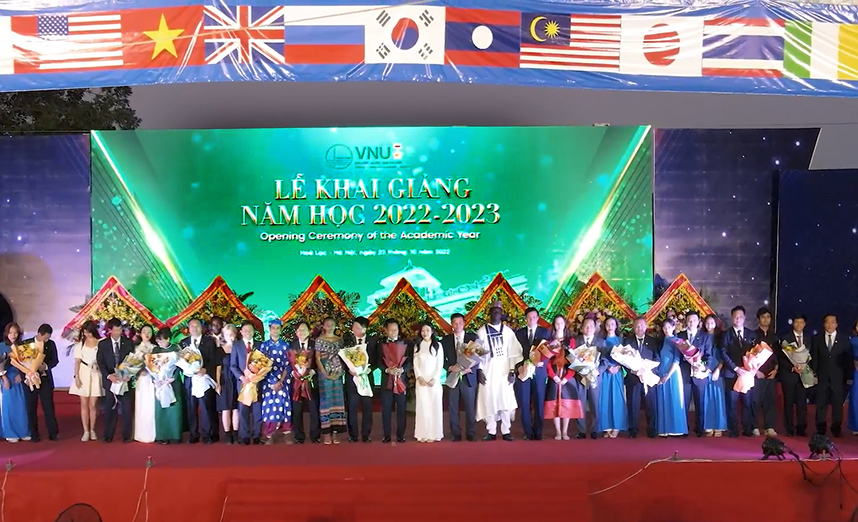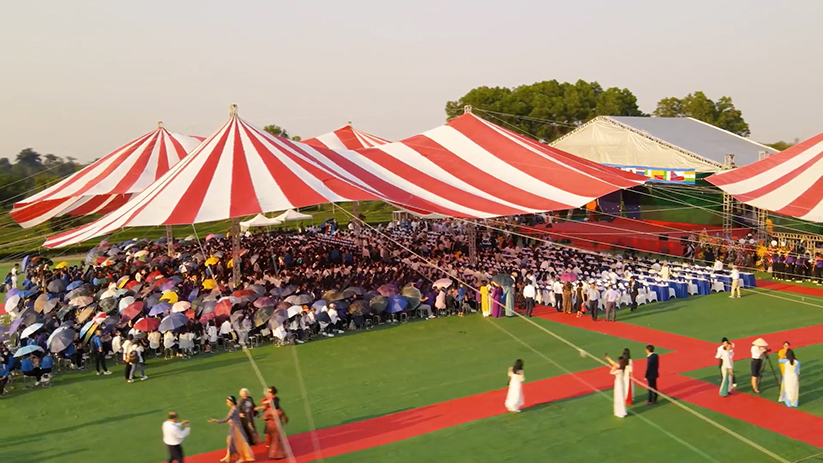Vietnam National University, Hanoi has three levels of administrative management:
1) Vietnam National University, Hanoi (VNU) is the central body assigned annual targets and plans by the Government; it has legal personality and a seal bearing the national emblem. The Director, Deputy Directors, and Chairman of the VNU Council are appointed and dismissed by the Prime Minister.
2) Member universities and scientific research institutes; affiliated schools, faculties, training and research centers for science and technology; and service units supporting training and scientific research under VNU are basic units with legal personality, their own seals and bank accounts.
3) Departments, research offices and equivalent units belonging to member universities, scientific research institutes and affiliated units.
Vietnam National University, Hanoi (VNU) operates under a mechanism of high autonomy and self-responsibility; it works directly with Ministries, ministerial-level agencies, government agencies, and People's Committees of provinces and centrally-administered cities on issues related to VNU's operations and development. Member universities and scientific research institutes of VNU are training and scientific and technological research institutions with a high degree of autonomy and legal status equivalent to other universities and scientific research institutes as stipulated in the Law on Education, the Law on Higher Education, the Law amending and supplementing certain articles of the Law on Higher Education, and the Law on Science and Technology.
The headquarters building of the University of Indochina (established in 1906, now the iconic image of Hanoi National University) is located at 19 Le Thanh Tong Street, Hoan Kiem District, Hanoi.
IMPORTANT HISTORICAL MILESTONES OF VIETNAM NATIONAL UNIVERSITY, HANOI
1906The University of Indochina was established by Decision No. 1514a dated May 16, 1906, of the Governor-General of Indochina, with its headquarters located at 19 Le Thanh Tong Street, Hoan Kiem District, Hanoi (during the French colonial period, it was Boulevard Bobillot Street).
Indochina University photographed from the inside (circa 1930s)
1945Based on the University of Indochina, the Vietnam National University was established, with its first course opening on November 15, 1945, under the chairmanship of President Ho Chi Minh. This was the first multidisciplinary university established under the Democratic Republic of Vietnam. The university's headquarters remain at 19 Le Thanh Tong Street, Hanoi.
1951Our state established the School of Basic Sciences (in the Viet Bac War Zone). This was one of the predecessor schools of what would later become Hanoi University.
1956According to Government Decision No. 2183/TC dated June 4, 1956, Hanoi University and Hanoi Pedagogical University were established.
Hanoi University is the first university of basic sciences (natural sciences and social sciences - humanities) in North Vietnam after peace was restored. Hanoi University directly inherited the traditions and physical and technical infrastructure of Indochina University (1906), Vietnam National University (1945) and the School of Basic Sciences (1951).
Hanoi Pedagogical University had a Faculty of Foreign Languages, which later developed into Hanoi University of Foreign Languages Education.
1967Hanoi University of Foreign Languages Education was established on the basis of the Faculty of Foreign Languages of Hanoi University of Education.
1985In November 1985, the Center for Resource and Environmental Research merged with the Mangrove Research Center of Hanoi Pedagogical University and became the Center for Resource and Environmental Research under Vietnam National University, Hanoi.
1993 - 1997With a strategic vision, the Party and State of Vietnam have identified education and science and technology as top national priorities. Following this principle, on January 14, 1993, the Fourth Conference of the Central Committee of the Communist Party of Vietnam (Seventh Term) issued a Resolution clearly outlining the task of "Establishing a number of key national universities" to serve as the leading force and backbone of higher education in the country. Vietnam National University, Hanoi (VNU-Hanoi) was established with this role and mission in mind.
Vietnam National University, Hanoi (VNU) was established on the basis of reorganizing three major universities in Hanoi: Hanoi University, Hanoi Pedagogical University I, and Hanoi University of Foreign Languages (Government Decree No. 97/CP dated December 10, 1993). VNU operates according to the Regulations on Organization and Operation issued by the Prime Minister under Decision No. 477/QD-TTg dated September 5, 1994.
According to Decree 97/CP, the Vietnam National University, Hanoi initially comprised the University of General Studies and four specialized universities: the University of Natural Sciences, the University of Social Sciences and Humanities, the University of Education, and the University of Foreign Languages; as well as research institutes and centers, and support units.
The inauguration ceremony of Vietnam National University, Hanoi will be held at the University building, 19 Le Thanh Tong Street, Hoan Kiem District, Hanoi.
During this period, several units were established by Vietnam National University, Hanoi (VNU), including: i) Units established in 1995: Student Dormitory Center; Faculty of Business Administration; VNU Newsletter; VNU Publishing House; System Development Center; VNU Science Journal (based on the reorganization of the Science Journal of Hanoi University); Center for Training of Lecturers in Marxist-Leninist Theory under Hanoi University, the predecessor of the Center for Training and Development of Political Theory Lecturers; Center for Quality Assurance in Training and Educational Research and Development; Farm 1A was transferred to VNU according to Decision No. 659/TTG dated October 16, 1995, of the Prime Minister, becoming a unit directly under VNU, serving as a prerequisite for preparing the project to build a new VNU campus in Hoa Lac; ii) Units established in 1996: Biotechnology Center; iii) The Center for Training and Development of Political Theory Lecturers; iii) The Information and Library Center was established on the basis of merging three libraries of: Hanoi University, Hanoi Pedagogical University I, and Hanoi University of Foreign Languages Education, according to Decision No. 66/TCCB dated February 14, 1997, of the Director of Vietnam National University, Hanoi.
1998
The government issued a Decree on the abolition of the University of General Studies, and in the same year, the Director of VNU signed Decisions to establish the VNU Printing House (separated from the VNU Publishing House) and the Center for Women's Studies.
1999The Director signed the Decisions establishing: i) the Ba Vi Ecological and Environmental Education Experimental Center; the Faculty of Economics under the Vietnam National University, Hanoi (July 1999); and the Faculty of Education according to Decision No. 1481/TCCB dated December 21, 1999.
2000Until 2000, Vietnam National University, Hanoi had 4 member universities (University of Natural Sciences, University of Social Sciences and Humanities, University of Foreign Languages, University of Education) and 3 affiliated faculties: Faculty of Technology (Decision No. 85/TCCB dated March 7, 2000), Faculty of Economics, Faculty of Education and other units…
In 2000, the University of Education separated from the organizational structure of Vietnam National University, Hanoi, becoming a university directly under the Ministry of Education and Training. At this time, Vietnam National University, Hanoi, only had the following departments and fields: mathematics and natural sciences, information technology and telecommunications (University of Natural Sciences), social sciences and humanities, economics, law (University of Social Sciences and Humanities), and foreign languages (University of Foreign Languages).
To further facilitate the development of the two National Universities (NUs), including Vietnam National University, Hanoi, the Standing Committee of the Politburo issued Conclusion No. 315-TB/TW on August 29, 2000, stating:
“The policy of building the two National Universities into multidisciplinary, high-quality training, scientific research, and technology transfer centers, on par with the region and gradually reaching international standards, is entirely correct and consistent with the development requirements of the country and the development trends of higher education in the region and the world... The National Universities are under the state management of the Ministry of Education and Training and other relevant ministries and sectors in accordance with the regulations of the Government and the Law on Education, ensuring a high degree of autonomy in activities related to training, scientific and technological research, finance, international relations, organizational structure, and personnel of the National Universities; creating the National Universities to become an organic entity that maximizes the effectiveness of building and utilizing the teaching staff, laboratories, and facilities...”.
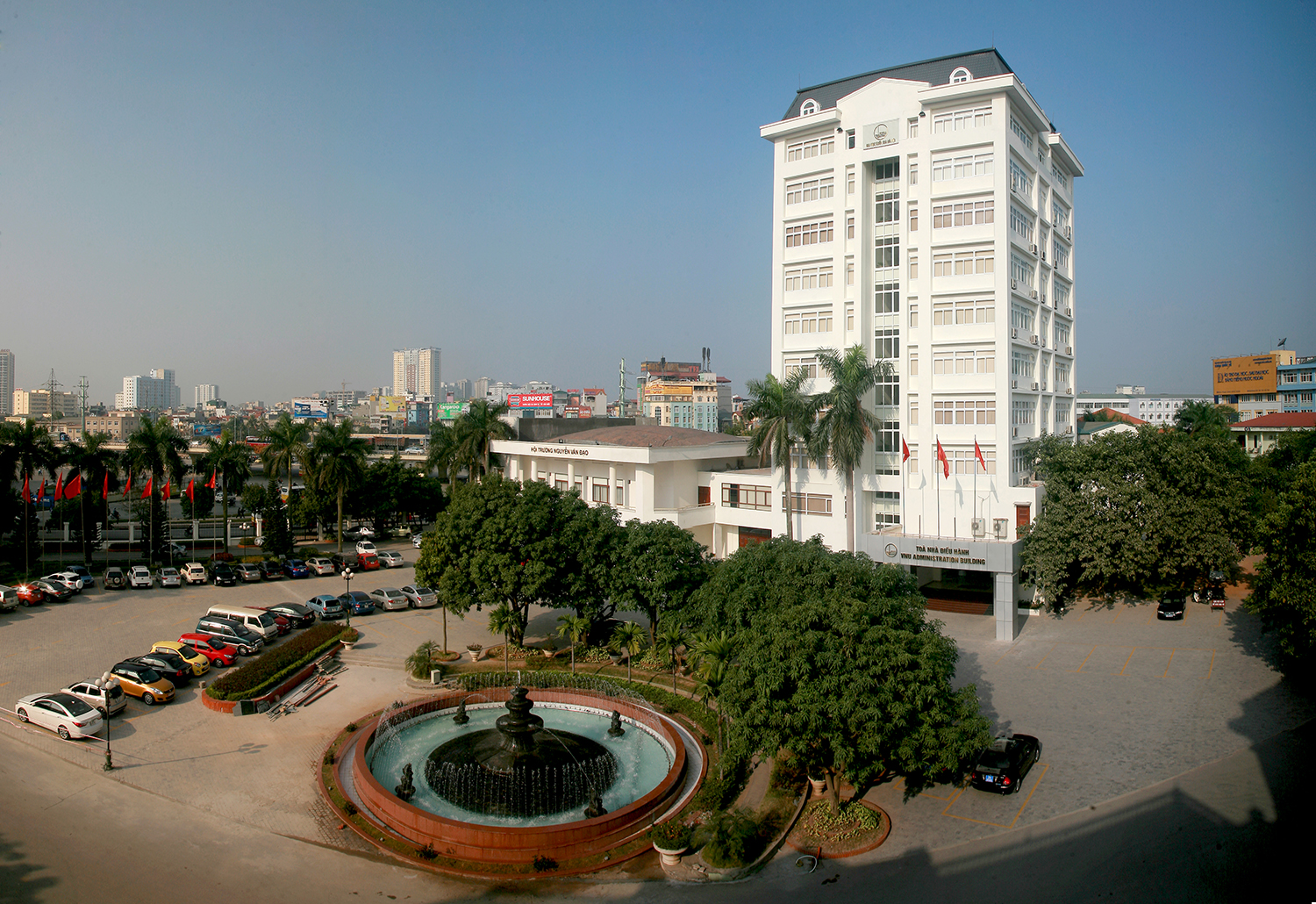
The Hanoi National University Administration building is located at 144 Xuan Thuy Street, Cau Giay District, Hanoi (inaugurated and put into use in December 1998).
2001In implementation of the Politburo Standing Committee's conclusions, the Government issued Decree No. 07/2001/ND-CP on February 1, 2001, concerning the Vietnam National University; on February 12, 2001, the Prime Minister issued Decision No. 14/2001/QD-TTg and Decision No. 16/2001/QD-TTg on the reorganization and promulgation of the Regulations on the Organization and Operation of the Vietnam National University. This is an important historical milestone marking a new stage of development for the Vietnam National University, Hanoi.
According to Decision No. 14/2001/QD-TTg, Vietnam National University, Hanoi (VNU) has three member universities: the University of Natural Sciences, the University of Social Sciences and Humanities, and the University of Foreign Languages; one member scientific research institute - the Institute of Information Technology; affiliated faculties and research centers; service units; the Office and functional departments. At that time, several functional departments had been established, including the International Relations Department, the Inspection Department, etc., and a Party and mass organization was established as the Party and Mass Organization Office Block.
2001In accordance with the agreement between Vietnam National University, Hanoi and the Korea Foundation for Advanced Studies (KFAS), the Center for Asian Studies Support was officially established under Decision No. 720/TCCB, dated December 13, 2001.
2002The Director of Vietnam National University, Hanoi signed the Decisions to establish: i) the Management Board for Construction Projects in Hoa Lac (April 29, 2002) and the Graduate School under Vietnam National University, Hanoi (May 20, 2002).
2003On December 20, 2003, Prime Minister Phan Van Khai officially broke ground on the construction of the Vietnam National University, Hanoi in Hoa Lac.
Period 2004 - 2006On March 19, 2004, the Institute of Vietnamese Studies and Development Science was established by Decision No. 40/2004/QD-TTg of the Prime Minister, based on the Center for Vietnamese Studies and Cultural Exchange under the Vietnam National University, Hanoi. This center is a continuation of the Center for Vietnamese Research Cooperation (Hanoi University) established by Decision No. 529/QD dated May 17, 1989, signed by the Minister of Education and Training.
On May 25, 2004, the University of Technology was established based on the upgrading and development of the Faculty of Technology and the Center for Cooperation in Training and Development of Mechanics under the Vietnam National University, Hanoi, according to Decision No. 92/2004/QD-TTg of the Prime Minister. Simultaneously, the Center for National Defense Education had been established on March 2, 2004, according to Decision No. 97/TCCB of the Director of the Vietnam National University, Hanoi.
On May 19, 2005, the Center for Training Technology and Employment Systems was established under the Vietnam National University, Hanoi, according to Decision No. 1073/QD-TCCB of the Director of the Vietnam National University, Hanoi.
In 2006, the Director of Vietnam National University, Hanoi, signed a decision to dissolve Farm 1A and transfer some personnel to work at the Center for Urban Research and the Ba Vi Center for Ecological and Environmental Education Experiments.
2007On March 6, 2007, the University of Economics was established based on the upgrading of the Faculty of Economics, according to Decision No. 290/QD-TTg of the Prime Minister.
On May 24, 2007, the Institute of Microbiology and Biotechnology was established based on the upgrading of the Biotechnology Center, according to Decision No. 661/QD-TTg of the Prime Minister.
2008The Science and Technology Development Fund of Vietnam National University, Hanoi was established by Decision No. 3042/QD-KHCN dated June 23, 2008, of the Director of Vietnam National University, Hanoi.
On December 24, 2008, the Center for Communication and Public Relations was established based on the reorganization of the VNU Newsletter and the VNU Website Department (Decision No. 6059/QD-TCCB of the Director of VNU).
The Center for Urban Development and Management of the University in Hoa Lac was established, and subsequently, together with the Management Board of Construction Projects in Hoa Lac (including the Management Boards of National-Hanoi Projects 05, 07, 09 and 10), it was merged and reorganized into the Management Board of Investment and Construction Projects of Vietnam National University, Hanoi in Hoa Lac, under the Ministry of Construction, according to Decision No. 1466/QD-BXD dated December 16, 2008, of the Minister of Construction.
2009On April 3, 2009, the University of Education was established on the basis of the Faculty of Pedagogy, according to Decision No. 441/QD-TTg of the Prime Minister.
Also in 2009, the Director of Vietnam National University, Hanoi signed decisions establishing the following affiliated units: i) Student Support Center (based on the addition of functions and tasks and renaming of the Student Dormitory Center), according to Decision No. 52/QD-TCCB dated January 7, 2009; ii) Center for Training Support and University Urban Development (based on the addition of functions and tasks and renaming of the Ba Vi Ecological and Environmental Education Experimental Center), according to Decision No. 874/QD-TCCB dated February 23, 2009; iii) Center for Physical Education and Sports based on the rearrangement and reorganization of physical education departments of the units (Decision No. 1652/QD-TCCB dated May 4, 2009). iv) Renaming the National Defense Education Center to the National Defense and Security Education Center (Decision No. 1737/QD-TCCB dated May 11, 2009); v) Center for Marine and Island Research (Decision No. 1757/QD-TCCB dated May 13, 2009); vi) International Center for Global Change Research (Decision No. 1758/QD-TCCB dated May 13, 2009); vii) Project Management and Development Board (Decision No. 4029/QD-TCCB dated November 26, 2009).
2010During the year, the Director of VNU signed decisions establishing the following affiliated units: i) Urban Research Center (Decision No. 629/QD-TCCB dated February 12, 2010); ii) Faculty of Medicine and Pharmacy (Decision No. 1507/QD-TCCB dated May 20, 2010); iii) Information Technology Application Center (based on two predecessor units: the Software Technology Center of the University of Technology and the VNUnet Center of the Institute of Information Technology), according to Decision No. 1736/QD-TCCB dated June 10, 2010; iv) The Vietnam National University, Hanoi (VNU) and Kyoto University Cooperation Office, abbreviated as VKCO (established on September 17, 2010, as a representative office for Japanese universities and a bridge in education between Vietnam and Japan. VKCO is one of eight cooperation offices worldwide of the Japanese Government); v) Upgrading the Center for Training Quality Assurance and Educational Research and Development into the Institute for Educational Quality Assurance under VNU (Decision No. 1980/QD-TCCB dated July 5, 2020).
On November 15, 2010, the Ministry of Education and Training assigned the Vietnam National University, Hanoi (VNU) to cooperate with the AUPELF-UREF organization (now the Agency for Francophone Universities - AUF) to organize, manage, and operate the Francophone Institute of Informatics, according to Decision No. 5206/QD-BGDĐT of the Minister of Education and Training.
2011During the year, the Director of VNU signed decisions establishing the following affiliated units: i) International Human Resources Center (Decision No. 2139/QD-TCCB dated July 29, 2011); ii) VNU Development Center (based on the merger of the Ba Vi Ecological and Environmental Education Experiment Center, the merger of a part of the Center for Training Support and University Urban Development, and the Administration and Security Department of the VNU Office), according to Decision No. 3592/QD-TCCB dated December 2, 2011; iii) Center for Cooperation and Knowledge Transfer (Decision No. 3619/QD-TCCB dated December 6, 2011). iv) The Vietnam National University Hanoi Hospital was established by Decision No. 3618/QD-TCCB dated December 5, 2011, and the Nano and Energy Center (Decision No. 3636/QD-VNU-Hanoi dated December 7, 2011).
To date, the Vietnam National University, Hanoi (VNU) has essentially become a high-quality, multidisciplinary center for undergraduate and postgraduate training, scientific research, and knowledge transfer, comprising a total of 43 units, including: 9 member units, with 6 universities (highly autonomous and responsible, with legal status equivalent to universities under the Ministry of Education and Training) and 3 member scientific research institutes; 5 affiliated faculties; 14 affiliated training and scientific research units (2 institutes and 12 training and research centers); and 15 affiliated units serving training and scientific research.
Furthermore, on August 16, 2011, the People's Committee of Hanoi City issued Decision No. 3737/QD-UBND, granting a license for the establishment and recognition of the Charter of the Vietnam National University, Hanoi Development Fund. Accordingly, the Vietnam National University, Hanoi Development Fund has legal personality as a unit performing special tasks of the Vietnam National University, Hanoi, operating on the principles of voluntarism, self-funding, and self-financing.
Despite some remaining challenges, Decree No. 07/2001/ND-CP dated February 1, 2001, on National Universities and the Regulations on the Organization and Operation of National Universities issued together with Decision No. 16/2001/QD-TTg dated February 12, 2001, of the Prime Minister have created favorable conditions for National Universities to exercise high levels of autonomy and self-responsibility under the state management of the Ministry of Education and Training and other relevant ministries in activities related to organizational structure, personnel, finance, international cooperation, training, and scientific research; The goal is to establish an educational institution model with an organic entity, interconnectedness, and comprehensive cooperation among member and affiliated units, effectively utilizing all resources, multidisciplinary advantages, diversity, and strengths of each unit within VNU to improve the quality of all activities, increase value, and create unique, highly competitive products. This has resulted in VNU being ranked among the top 250 universities in Asia by the QS World University Rankings (topuniversities.com), with the natural sciences (ranked 61st) and life sciences and biomedical sciences (ranked 84th), contributing to enhancing the prestige and brand of each unit, as well as VNU and the entire Vietnamese higher education system; and actively promoting the country's industrialization, modernization, and international integration.
In summarizing the evaluation of university models, Deputy Prime Minister Nguyen Thien Nhan affirmed that Vietnam National University, Hanoi (VNU) has taken the right direction in building and developing a high-quality, multi-disciplinary university model in accordance with Government Decree No. 07/2001/ND-CP and Prime Minister's Regulation No. 16/2001/QD-TTg (source: Government Electronic Newspaper).
2013On September 5, 2013, the Center for Educational Quality Accreditation was the first educational quality accreditation organization established in Vietnam, according to Decision No. 3568/QD-BGDĐT of the Minister of Education and Training.
In order to implement the Law on Higher Education, the two National Universities collaborated with the Ministry of Education and Training to draft a new Decree on National Universities and Regulations on the Organization and Operation of National Universities and their member higher education institutions, which were submitted to the Government and the Prime Minister for promulgation. On November 17, 2013, on behalf of the Government, the Prime Minister signed and promulgated Decree No. 186/2013/ND-CP on National Universities (replacing Decree No. 07/2001/ND-CP dated February 1, 2001 of the Government on National Universities).
To ensure compliance with new legal regulations, and to determine job positions within member units and affiliated units, based on a review and assessment of the current situation, potential, capacity, and operational efficiency of these units, the Party Committee and the Council of VNU issued Resolution No. 118-NQ/DU dated July 4, 2013, of the 14th Conference of the Party Committee of VNU on the Project for Adjusting, Reorganizing, and Developing the Organization within VNU. Accordingly, VNU has implemented the Project for Adjusting, Reorganizing, and Developing the Organization within VNU in the direction of streamlining the organizational structure, strengthening resources for member units, and investing in the development of affiliated units after the adjustment and reorganization. The organizational structure of VNU is clearly defined according to 4 groups: (i) Member universities and scientific research institutes; (ii) Subordinate units oriented towards developing into member universities or scientific research institutes in the future; (iii) Service units; iv) Business and service units.
As a result, several units and organizations have been adjusted and reorganized: (i) The Inspection Board was renamed the Inspection and Legal Affairs Board; the International Relations Board was renamed the Cooperation and Development Board; (ii) The Project Management and Development Board was renamed the Project Management Board; (iii) The International Human Resources Center was renamed the Center for Human Resources Forecasting and Development (Decision No. 3089/QD-TCCB dated September 4, 2013); (iv) Several units were merged into member universities such as: the Center for Training and Development of Lecturers and Political Theory, the Center for Women's Studies, the Center for Nano and Energy, and the Center for Marine and Island Research; (v) Several units were merged into member universities/scientific research institutes or affiliated units: the Center for Communication and Public Relations; Information Technology Application Center, University Urban Development and Training Support Center, VNU Printing House; (vi) Several units were dissolved, such as VNU Printing House, University Urban Development and Training Support Center, and Communication and Public Relations Center.
On the other hand, VNU has organizations performing special tasks such as: (i) the Office of the State-level Key Science and Technology Program “Science and Technology for Sustainable Development of the Northwest Region” (abbreviated as the Northwest Program Office); (ii) the VNU Scientist Links Club (English name: VNU - Scientist Links, abbreviated: VSL), established on February 7, 2013 (Decision No. 463/QD-TCCB dated by the Director of VNU), is an organization under VNU operating on a voluntary and non-profit basis to connect scientists within VNU.
2014To increase autonomy and accountability in member higher education institutions, based on the regulations in the Law on Higher Education and Government Decree No. 186/2013/ND-CP dated November 17, 2013, on the National University, on March 26, 2014, the Prime Minister signed Decision No. 26/2014/QD-TTg promulgating the Regulations on Organization and Operation of the National University and its member higher education institutions. This new regulation replaces the Regulations on Organization and Operation of the National University issued with Decision No. 16/2001/QD-TTg dated February 12, 2001, of the Prime Minister. The provisions in Regulation No. 26/2014/QD-TTg clearly reflect the Government and Prime Minister's innovative perspective on the National University in the process of sustainable development and integration.
In 2014, the Prime Minister also signed a Decision establishing the Vietnam-Japan University under the Vietnam National University, Hanoi, based on an agreement between the Governments of Vietnam and Japan (Decision No. 1186/QD-TTg dated July 21, 2014).
Simultaneously, in 2014, following the directives of the Party Committee of VNU, the Board of Directors of VNU, several affiliated units continued to be adjusted and reorganized: (i) The Institute of Francophone Informatics was renamed the International Institute of Francophone Studies (Decision No. 4299/QD-VNU dated November 18, 2014) to expand the scope of activities of the Institute of Francophone Informatics, aiming to develop it into a high-quality interdisciplinary international research and training center; (ii) the Management Board of the Vietnam-Japan University was established according to Decision No. 2589/QD-VNU dated July 30, 2014; (iii) Merging the Center for System Development and the Center for Training Technology and Employment Systems into the Center for Human Resource Forecasting and Development (Decision No. 5650/QD-VNU and Decision No. 5651/QD-VNU dated December 31, 2014); (iv) Merging the Center for Information Technology Application into the Institute of Information Technology; (v) Merging the International Center for Global Change Research into the Center for Resource and Environment Research; (vi) Changing the model of the Center for Asian Research Support to a state of not being a unit directly under VNU.
At the end of Phase 1 of the Project for Adjusting, Reorganizing, and Developing the Organization (2013-2014), Vietnam National University, Hanoi (VNU) completed the restructuring of its affiliated units to meet new requirements, specifically: restructuring the Publishing House (with a streamlined administrative apparatus and 3 business service centers), renaming and merging 2 Centers into the Center for Forecasting and Human Resource Development, renaming the Institute of Francophone Informatics... The organizational structure of VNU was streamlined from 43 units to 29 units and clearly defined into 3 types: i) Training units; ii) Scientific research units; iii) Service units, contributing to consolidating VNU into an organic entity with a reasonable scale, minimizing overlapping functions and tasks between units.
2015In order to promote the implementation of Central Resolution No. 6 on the development of science and technology (Resolution No. 20-NQ/TW), Central Resolution No. 8 on fundamental and comprehensive reform of education and training (Resolution No. 29-NQ/TW), and to achieve the important targets set out in the 5th Party Congress of Vietnam National University, Hanoi, term 2015-2020, Vietnam National University, Hanoi continues to implement phase 2 of the Project on adjusting, reorganizing and developing the organizational structure of member units and affiliated units.
2016
To achieve its strategic goal of developing into a research-oriented, multidisciplinary, and multi-field university, Vietnam National University, Hanoi (VNU) is also establishing new units, transforming the organizational and operational models of several units, and upgrading some affiliated units into member universities and scientific research institutes under VNU. In 2016, the Prime Minister signed a Decision establishing the Tran Nhan Tong Institute (Decision No. 1717/QD-TTg dated September 1, 2016) and establishing the Institute of Resources and Environment based on the upgrading of the Center for Resource and Environment Research (Decision No. 2218/QD-TTg dated November 17, 2016).
Also in 2016, the Director of Vietnam National University, Hanoi (VNU) issued a Decision to upgrade the VNU Testing Center from being under the Institute for Educational Quality Assurance to the VNU Testing Center directly under VNU (Decision No. 2099/QD-VNU dated July 21, 2016). Simultaneously, the name and functions of the Faculty of Business Administration were adjusted to the Faculty of Management and Business (Decision No. 2211/QD-VNU dated July 29, 2016); the Management Board of the Vietnam-Japan University was renamed the Project Management Board of the Vietnam-Japan University (Decision No. 3170/QD-VNU dated October 14, 2016); and the VNU-Kyoto University Cooperation Office was dissolved (Decision No. 294/QD-VNU dated February 5, 2016).
In addition, in 2016, Vietnam National University, Hanoi (VNU) established two organizations with special tasks: i) The VNU Alumni Club, established on April 11, 2016 (Decision No. 979/QD-VNU), aims to promote the development of VNU's alumni network to connect intellectually and emotionally for life, serving as a bridge between students and businesses; ii) The VNU-University of Arizona Cooperation Office, established in December 2016 (according to a cooperation agreement with the University of Arizona, USA).
2017Based on the objectives, tasks, and solutions outlined in Resolution No. 18-NQ/TW and Resolution No. 19-NQ/TW of the Sixth Plenum of the Central Committee of the Communist Party of Vietnam, 12th term, on October 25, 2017, in 2017, Vietnam National University, Hanoi (VNU) carried out restructuring, adjustments, and reorganization to stabilize the organization and operation of several units: (i) Adjusting the name and functions and tasks of the Graduate School to the Faculty of Interdisciplinary Sciences (Decision No. 248/QD-VNU dated January 20, 2017); (ii) renaming the Center for Cooperation and Knowledge Transfer to the Center for Knowledge Transfer and Entrepreneurship Support (Decision No. 269/QD-VNU dated January 24, 2017); (iii) merging the VNU Guest House; (iii) Transferring the remaining functions and tasks at Facility 1 of the VNU Development Center located at 144 Xuan Thuy Street, Cau Giay District, Hanoi to the VNU Office and subsequently dissolving the VNU Development Center; (v) Transferring the Information Technology Application Center from the Institute of Information Technology to the VNU Office; (vi) Renaming the National Defense and Security Education Center to the National Defense and Security Education Center (Decision No. 2333/QD-VNU dated July 24, 2017).
Vietnam National University, Hanoi (VNU) is undergoing organizational and personnel changes to fulfill its special tasks: preparing to establish the Office of National Missions; and implementing procedures to be ready to take over the VNU construction investment project in Hoa Lac based on Decision No. 2068/QD-TTg dated December 21, 2017, of the Prime Minister on the transfer of the VNU construction investment project in Hoa Lac from the Ministry of Construction to VNU.
2018On January 22, 2018, the Director of Vietnam National University, Hanoi (VNU) signed Decision No. 282/QD-VNU establishing the Office of Science and Technology Tasks at the VNU level “Building the National Geographic Encyclopedia of Vietnam”, abbreviated as: Office of National Geographic Tasks, under VNU, to carry out this special task.
Based on Decision No. 206/QD-BXD dated February 13, 2018, of the Minister of Construction and other relevant documents, the Director of Vietnam National University, Hanoi (VNU) signed a Decision on the acceptance of the VNU Hoa Lac Construction Investment Project Management Board (Decision No. 698/QD-VNU dated March 5, 2018) and assumed the role of investor for the VNU Hoa Lac Construction Investment Project. This is also the stage where VNU finalizes the organizational structure model to implement the investment and construction tasks of the VNU urban area in Hoa Lac.
2020
The Office of the Project for the Development of the Center for Vietnamese Studies Documentation at VNU Hanoi, abbreviated as the Office of the Project for the Center for Vietnamese Studies Documentation, is under the direct supervision of VNU Hanoi and was established on July 31, 2020 (Decision No. 2206/QD-DHQHGN).
On October 27, 2020, the Prime Minister signed Decision No. 1666/QD-TTg establishing the University of Medicine and Pharmacy as the eighth member university of Vietnam National University, Hanoi, based on the upgrading and development of the Faculty of Medicine and Pharmacy. According to the establishment decision, the University of Medicine and Pharmacy has legal personality, its own seal and bank account; operates autonomously according to government regulations; is under the direct management of Vietnam National University, Hanoi, the state management of higher education by the Ministry of Education and Training, and the territorial management of the Hanoi People's Committee.
2021On October 28, 2021, the Director of Vietnam National University, Hanoi (VNU) signed Decision No. 3333/QD-VNU establishing the Project Management Board for the “Development of Vietnamese National Universities - VNU Sub-project”, abbreviated as the World Banks Project Management Board.
On December 1, 2021, the Director of Vietnam National University, Hanoi (VNU) signed Decision No. 3868/QD-VNU establishing the International School based on the reorganization of the International Faculty, VNU, and Decision No. 3869/QD-VNU establishing the School of Management and Business based on the reorganization of the Management and Business Faculty, VNU.
In 2021, the Director of VNU signed a Decision to readjust the functions and tasks of the VNU Development Center in Hoa Lac and the VNU Investment and Construction Project Management Board in Hoa Lac; transferred the VNU Newsletter, part of the Scientific Journal, to the Information and Brand Management Department, VNU Office; and reorganized the Information Technology Application Center under the VNU Office into the Digital University Management Center.
2022On February 14, 2022, the Director of Vietnam National University, Hanoi (VNU) signed Decision No. 316/QD-VNU renaming the Information and Library Center to the Library and Digital Knowledge Center, effective from March 1, 2022.
In line with the Vietnam National University, Hanoi's Development Strategy to 2030, Vision 2045; the Science, Technology and Innovation Strategy; and the Prime Minister Pham Minh Chinh's directive on developing the Vietnam National University, Hanoi Urban Area according to the "5-in-1" model, Vietnam National University, Hanoi is developing projects to implement the following tasks: (i) Transforming the Faculty of Interdisciplinary Sciences into the School of Interdisciplinary Science, Creativity and Arts; (ii) Establishing a Faculty/Institute under the International School as a prerequisite for developing into the International Hotel Management School under Vietnam National University, Hanoi later; (iii) Transforming the organizational structure and operation of the International Institute of Francophone Studies from a scientific research unit to a training faculty under Vietnam National University, Hanoi; (iv) Establishing an Investment Promotion Board as a functional board of Vietnam National University, Hanoi; (vi) Renaming the Vietnam National University, Hanoi Development Center in Hoa Lac to the University Urban Management Center. (v) Establish the VNU-Holdings Investment and Development Joint Stock Company; and (vi) Submit to the Prime Minister for approval the plan to transfer the Construction Hospital under the Ministry of Construction to VNU.
On May 19, 2022, in implementation of the Resolution of the 9th Conference of the Executive Committee of the Party Committee of Vietnam National University, Hanoi (VNU), term VI, with the decisive efforts of units under the VNU administration and some related units, VNU officially moved its headquarters to Hoa Lac.
Furthermore, in June 2022, the Director of VNU signed Decision No. 1850/QD-VNU dated June 6, 2022, on the establishment of the Office of Key Science and Technology Programs at VNU, based on the merger of the Northwest Program Office (established in 2013), the National Mission Office (established in 2018), and the Vietnam Studies Documentation Center Project Office (established in 2020); and Decision No. 1892/QD-VNU dated June 8, 2022, establishing the Executive Board of the VNU Alumni Entrepreneurs Club for the 2022-2027 term.
In implementation of the Resolution of the Tenth Conference of the Party Committee of VNU, and the Resolution of the VNU Council for the 2018-2023 term, on August 15, 2022, the Director of VNU signed Decision No. 2179/QD-VNU on the establishment of the Investment Promotion Board as a functional board of VNU.
On September 23, 2022, the Prime Minister signed Decision No. 1124/QD-TTg establishing the University of Law as a member university of Vietnam National University, Hanoi, based on the Faculty of Law under Vietnam National University, Hanoi. Accordingly, the University of Law has its main campus in Hanoi; is a public higher education institution and a member of Vietnam National University, Hanoi; operates autonomously according to the law; has legal personality, its own seal and bank account; is under the direct management of Vietnam National University, Hanoi, the state management of higher education by the Ministry of Education and Training, and territorial management by the People's Committee of Hanoi.
Thus, to date, the organizational structure of Vietnam National University, Hanoi (VNU) comprises 36 units, including: VNU's administrative body (Office, 9 functional departments and the Party and mass organization office) and 35 member units and affiliated units, including: 9 member universities; 2 affiliated schools, 1 affiliated faculty and 2 general subject training centers; 5 member scientific research institutes, 2 affiliated scientific research institutes, and 14 affiliated service and support units. Within VNU's member universities are 4 high schools (Foreign Language Specialized High School, Natural Sciences Specialized High School, Social Sciences and Humanities Specialized High School, and Educational Sciences High School) and 1 junior high school (Foreign Language Junior High School). VNU has 8 organizations performing special tasks (1 Center, 2 Offices, 2 Development Funds, 3 Clubs), details of which are shown in the Organizational Chart.
After nearly 30 years of construction and development, Vietnam National University, Hanoi (VNU) currently has 35 member and affiliated units. The scale of training has continuously increased to meet the needs of the labor market, with nearly 55,000 students across various training systems (including approximately 5,900 high school and junior high school students; approximately 40,000 full-time undergraduate students; approximately 9,000 postgraduate and doctoral students) and nearly 995 international students. Indicators of staff development have continuously increased, contributing to the university's ranking, notably with approximately 2,500 scientific staff, nearly 1,400 visiting lecturers, a ratio of lecturers with doctoral degrees or PhDs to full-time lecturers reaching 65%; a ratio of scientific staff with doctoral degrees reaching 61%; and a ratio of lecturers with professor or associate professor titles among full-time lecturers reaching 19.8% at times. The ratio of professors and associate professors to scientific staff is 19%, and the average number of scientific publications on the WoS and Scopus databases per total number of scientific staff per year is 0.44.
With determination and persistent, comprehensive innovation, the quality of training at Vietnam National University, Hanoi (VNU) continues to be highly valued by society. VNU's pioneering and innovative training models have received positive feedback from students and society. The structure of training disciplines has undergone a breakthrough development, shifting towards adapting to the digital transformation revolution, increasing applicability and the ability to start businesses and innovate. Training units are linking training with the labor market, proactively grasping the needs of businesses or developing training programs with the participation of businesses to ensure the quality of graduates. VNU continues to prioritize the implementation of basic science, talent, advanced, high-quality, and internationally standardized training programs. The development of these training programs aims to train high-quality human resources for the domestic and international labor markets, meeting the demands of society in the process of international integration and globalization. In addition, interdisciplinary and cross-sectoral training programs have been expanded, contributing to the provision of high-quality human resources with interdisciplinary thinking for the country's key economic sectors.
In scientific research, Vietnam National University, Hanoi (VNU) has established a direction and focused on developing as an innovative university. Accordingly, alongside a continuously increasing number of international publications, inventions, patents, and knowledge transfer into practice have been consistently promoted. Innovation value chains within VNU have been boosted, and VNU's innovation activities continue to achieve outstanding results. The vast intellectual property of VNU scientists transferred into practice has contributed to effectively solving societal problems and addressing societal needs. The scientific and technological potential at VNU has received significant investment and development. Many mechanisms and policies to value and reward scientists and scientific and technological products have been implemented, creating momentum to promote the development of scientific and technological potential. The proportion of highly qualified scientific staff meeting the criteria of a research university, including many leading experts and internationally recognized scientists, is capable of conducting breakthrough research and interdisciplinary research programs and tasks. The development orientation of key laboratories has been strengthened, especially the strategy to develop an interdisciplinary laboratory system in Hoa Lac - Zone 22.9 hectares - to innovate research organization linked to the needs of businesses, aiming to create research that contributes to solving major national problems and producing science and technology products for practical application.
In line with its mission to contribute to the socio-economic development of the country, Vietnam National University, Hanoi (VNU) continues to demonstrate its national responsibility by participating in and leading research programs of significant scale, possessing contemporary, national, and humanistic values, and having high scientific and practical significance for the development of society and the country, such as: the Science and Technology Program for Sustainable Development of the Northwest Region, the Task of Building the National Geographical Encyclopedia of Vietnam, the Vietnam Studies Documentation Center, the Project on Translation and Promotion of the Value of the Quintessence of Eastern Classical Works, and the proposal for a Science and Technology Program to attract investment and develop the socio-economic development of Vietnam's coastal regions, etc.
In its collaborative and development activities, promoting cooperation between universities, the government, local authorities, and businesses has contributed to affirming the tangible effectiveness of VNU's operations. VNU continues to attract resources from major domestic and international business partners.
The achievements in various aspects of its operations over the past nearly 30 years have helped Vietnam National University, Hanoi (VNU) continue to make strong progress, affirming its reputation, establishing its position as a leading university in Vietnam, and ranking among the top universities in the region and the world. VNU's ranking in prestigious world rankings has been consistently maintained and improved. VNU consistently ranks number 1 in Vietnam and is in the 801-1000 group globally according to the Times Higher Education (THE) and QS rankings. Several of VNU's fields are among the top 500 universities worldwide. According to THE rankings, VNU's indicators for teaching, scientific research, and international integration are also among the top higher education institutions in Vietnam. Notably, most recently, Vietnam National University, Hanoi (VNU) was ranked among the top 101-150 higher education institutions under 50 years old in the world according to the QS ranking.
In particular, with its mission as a pioneering university in training and scientific research, Vietnam National University, Hanoi (VNU) has collaborated with partner units to build and develop platforms supporting the national education system; spreading and developing a culture of quality; and bridging the gap between learners and employers, such as: an online channel supporting primary education, a channel for quality higher education and vocational training, a channel for Vietnamese language training for Vietnamese people abroad, and a platform for connecting and supporting businesses…
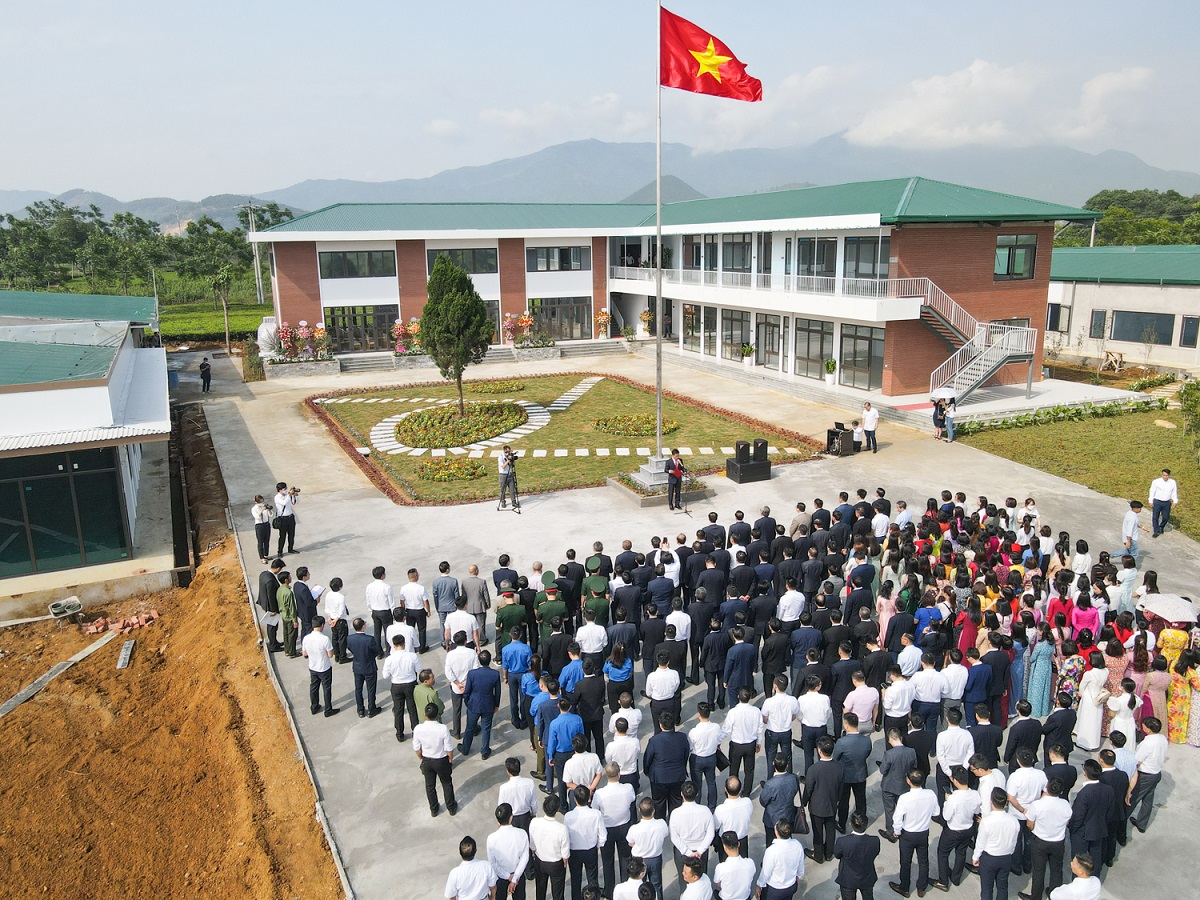
Hanoi National University Administration Building in Hoa Lac - the first working day of the Hanoi National University Administration at its new headquarters in Hoa Lac, May 19, 2022.
Rendering of the VNU Hanoi Central Administration Center in Hoa Lac, scheduled for completion in 2025.
Buildings HT1 and HT2 at the Hoa Lac campus, equivalent in size to the University of Science in downtown Hanoi, welcomed students in September 2022.
A view of the Vietnam National University, Hanoi campus in Hoa Lac, featuring the Library and Digital Knowledge Center building complex, which officially commenced operations in April 2022. On October 23, 2022, Vietnam National University, Hanoi (VNU) held its first opening ceremony at Hoa Lac. Teaching and learning at the campuses in Hoa Lac began in September 2022. In the 2022-2023 academic year, nearly 6,000 students studied at Hoa Lac, including students from various VNU training units such as the University of Medicine and Pharmacy, the University of Education, the Vietnam-Japan University, and the International School.
